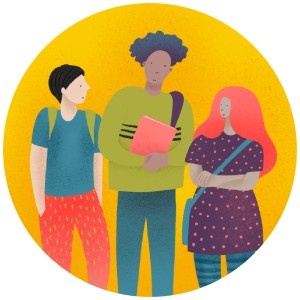Prevention
![]()
![]() Young people often tell us of sexual violence they experience in many areas of their lives – in relationships, peer groups, homes, education and work, on and offline. Increasingly they tell us that sexual harassment, intimate image abuse, sexual assault and other forms of sexual violence are a problem.
Young people often tell us of sexual violence they experience in many areas of their lives – in relationships, peer groups, homes, education and work, on and offline. Increasingly they tell us that sexual harassment, intimate image abuse, sexual assault and other forms of sexual violence are a problem.
Education on issues like consent, gender equality and healthy relationships is key to preventing sexual violence and to making lasting change. These issues sit at the heart of our conversations with young people, which also create opportunities to let them know how they can access support if they need it, and that they’re not alone.
 Sexual Violence Prevention Programme
Sexual Violence Prevention Programme
Our national Sexual Violence Prevention Programme is funded by the Scottish Government to deliver workshops across Scotland to young people on four different topics Power, Consent, Understanding Sexual Violence and Pornography, each adapted for three ages/stages.
This work is led by specialist Prevention Workers based in local Rape Crisis Centres and places an emphasis on young people’s participation and leadership. Programmes are planned in partnership with schools and youth groups to best meet their needs.
The prevention programme promotes children’s rights to protection from violence and abuse – find out about the UN Convention on the Rights of the Child here and view the training tool here. Read our Children's Rights and Wellbeing Impact Assessment here.
For more information on prevention work in your area please contact us.
Equally Safe at School: a whole school approach 
Equally Safe at School (ESAS) is a whole school intervention which aims to positively influence the school culture by fostering a shared, consistent, preventative approach to gender-based violence. By working closely with the whole school community, and looking at all parts of their school system, we can support schools in addressing gender-based violence and promoting equality.
The intervention comprises six key parts; whole school assessments, a pupil-led action group, staff training, policy development, curricular enhancement and a pupil-led school campaign.
Underpinned by principles of equality, accessibility and safety, Equally Safe at School places young people’s voices at the forefront and works with them, as well as with school staff, to identify how schools can best prevent and respond to incidents and disclosures of gender based violence.
You can visit the Equally Safe at School website here.
For more information on Equally Safe at School, please contact us.
Colleges and Universities
Rape Crisis Centres across Scotland can offer a range of services to support further and higher education institutions to prevent gender-based violence (GBV), respond to disclosures, and support students and staff affected by it, as part of the Equally Safe in Colleges and Universities (ESCU) national strategic work. Services include:
ESCU GBV First Responder Staff Training
Two tiered training delivered by Rape Crisis, originally in the Equally Safe in Higher Education (ESHE) toolkit, that equips staff with the knowledge and skills to respond to disclosures of GBV, and improve students’ experiences of seeking help. Further training is available which specifically looks at domestic abuse and understanding and responding to BME women’s experiences of domestic abuse. This is delivered by Scottish Women’s Aid and Shakti as two half-day events.
GBV eLearning Module:
A free 45 minute interactive module for students that includes information on gender-based violence, consent, bystander approaches and how to access support. Universities and Colleges can easily embed the module as part of their prevention work.
Let’s Talk about Sexual Violence (Peer Education Program)
A peer education programme designed to equip students with the skills to deliver a workshop to their peers on issues related to sexual violence. This program requires someone within the college/university to coordinate and support students involved.
You can find out more by watching this interview filmed with College Development Network, during the COVID-19 pandemic.
For any other enquiries about our prevention work, please contact our Prevention Manager.